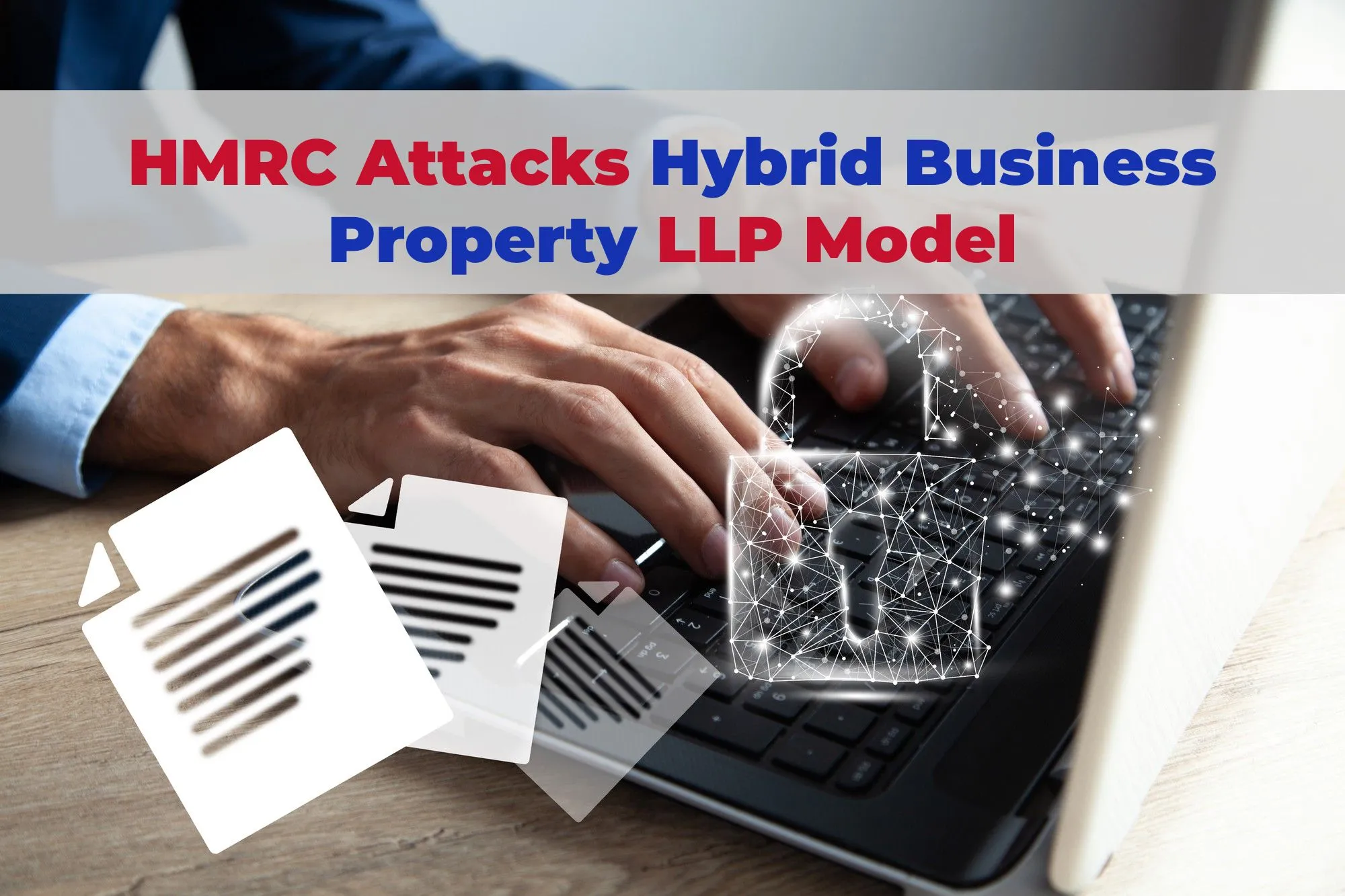HMRC is responsible for ensuring that individuals and businesses in the UK pay the correct amount of tax. Over the years, HMRC has encountered various tax planning schemes designed to minimise tax liabilities. In recent times, HMRC has become aware of a particular scheme marketed to individual property landlords as a tax planning option.
This scheme, sometimes referred to as a hybrid business model, makes bold claims about its:
- Ability to bypass and avoid mortgage interest relief restrictions allowing interest deductions,
- Reduce tax on property business profits,
- Decrease Capital Gains Tax (CGT) upon property sales, and
- Reduce Inheritance Tax (IHT) upon the landlord’s death.
However, HMRC firmly maintains that this scheme does not work as intended.
Understanding the Scheme
The tax planning scheme in question operates by allowing individual or joint property landlords to restructure their property business through the creation of a Limited Liability Partnership (LLP) with a corporate member.

The key steps involved in this scheme are as follows:
Formation of a Limited Company
The individual landlords or their family members establish a limited company.
Creation of an LLP
In parallel with the limited company, the individual landlords set up an Limited Liability Partnership (LLP), with the limited company acting as the corporate member.
Property Transfer
The individual landlords transfer their properties to the LLP.
Profit Allocation
The members of the LLP, including the individual landlords and the corporate member, allocate profits on a discretionary basis to ensure specific outcomes:
- Individual members remain basic rate taxpayers.
- Remaining profits are allocated to the corporate member.
Corporate Member Deductions
The corporate member claims deductions for finance costs, such as mortgage interest, related to the properties.
Read our article on “Interest Relief Restriction Section 24” for more insight and expert advice on rental tax.
Marketing to Landlord with Reduced Tax
Landlords are advised and marketed that this arrangement leads to reduced tax liability for several reasons:
- The property transfer to the LLP incurs no upfront tax cost, and the base costs of the properties are adjusted to their market value for CGT purposes thereby reducing the Capital Gain Tax due on future sale of properties.
- The individual landlords remain basic rate taxpayers, avoiding mortgage interest restrictions.
- The corporate member can claim full deductions for finance costs without facing restrictions.
- The corporate member is subject to Corporation Tax on its net profit share instead of higher or additional Income Tax rates that would be applicable to landlords, if the profits are allocated to the landlord.
- Calculating CGT using the uplifted base cost upon property contribution to the LLP reduces the CGT paid compared to using the original purchase and improvement costs when selling the properties.
- Business Property Relief (BPR) may be claimed for a property rental business in respect of a hybrid structure carrying a property rental business, resulting in no Inheritance Tax (IHT) upon the death of the landlords.
HMRC’s Perspective
HMRC strongly disputes the effectiveness of this scheme. According to the tax authority, the arrangement is primarily subject to several pieces of legislation:
1.
Mixed Member Partnership Legislation
The Income Tax (Trading and Other Income) Act 2005 contains provisions (S850C and S850D) that detail how excess profits of a corporate member of an LLP are redistributed to individual members.
2.
Partnership Anti-Avoidance Legislation
The Income Tax Act 2007, Chapter 5AA, S809AAZA, applies to charge the corporate member’s income on the transferor of the income stream, which is the landlord in this case.
3.
Transparency of LLPs
The Taxation of Chargeable Gains Act 1992, S59A, treats dealings in chargeable assets by an LLP as if done by the individual members. Therefore, the base cost of properties remains unchanged after their transfer to the LLP as members own fractional share of the LLP.
4.
HMRC asserts that a property rental business is unlikely to qualify for Business Property Relief (BPR) exemptions under the Inheritance Tax Act 1984, s105(3), especially when it involves the use of a hybrid business model.
HMRC considers that a property rental business is likely to be within the exclusion from Business Property Relief.
Navigating the Complex World of property tax , explore article on “Property Business Arrangements Involving Hybrid Partnerships” for deep insight on tax compliance .
Actions for Those Involved

HMRC advises individuals using this or similar schemes to withdraw from them and settle their tax affairs promptly. Anyone already involved in this tax planning arrangement and wish to rectify their situation can initiate this process by taking independent professional tax advice and settle their position by emailing HMRC at spotlight63@hmrc.gov.uk, who will provide further guidance and information.
Individuals concerned about their current tax schemes are also encouraged to consider the following actions:
- Seek independent professional tax advice.
- Consult tax charities such as TaxAid, which provides assistance and guidance through its helpline.
Implications for Scheme Promoters
Scheme promoters have a legal obligation to comply with the Disclosure of Tax Avoidance Schemes (DOTAS) legislation. This mandates that they disclose any tax planning arrangements they are marketing to HMRC.
Failure to do so within 5 days of making the scheme available can result in penalties, initially up to £600 per day. In cases where this is insufficient as a deterrent, promoters may face penalties of up to £1 million.
Furthermore, HMRC retains the authority to publish information about tax avoidance schemes and individuals involved in their promotion and supply.
Less Tax For Landlords, one of the Hybrid Partnership scheme provider, has put the following notice to its hybrid scheme clients.
“This is an important message to all clients and contacts of Less Tax for Landlords.
We are currently contacting HMRC regarding the recent publication of new guidance on their website for Hybrid Partnership arrangements, a type of structure that LT4L use with some of our clients.
The implication is that there is a requirement to register with HMRC under DOTAS, and we are currently looking to clarify our position to ensure that we remain compliant at all times.
As a company, we are committed to providing the best possible service and we are doing everything we can to obtain the full picture, at which point we will advise further.
Please note that whilst we undertake this exercise we will not be accepting new appointments in line with the guidelines, although existing clients can contact us through the usual channels.”
Furthermore , National Residential Landlords Association (NRLA) has issued a statement in their website saying they have suspended partnership activity with Less Tax for Landlords.
Reporting Tax Schemes
Individuals who come across tax avoidance schemes or suspect wrongdoing related to such schemes can report them to HMRC. An online reporting form is available for this purpose, and individuals may choose to submit reports anonymously.
Alternatively, if online reporting is not feasible, individuals can contact HMRC by phone to report instances of tax fraud or avoidance.
ALERT : HMRC actively pursues individuals and entities that promote or enable tax avoidance, leveraging the enablers penalty regime against those who design, sell, or facilitate the use of abusive tax avoidance arrangements that are subsequently defeated.
Conclusion
HMRC’s stance on the tax planning scheme marketed to property landlords is clear: it does not work as advertised and is subject to various legislative provisions aimed at preventing tax avoidance.
Individuals who have participated in such schemes are encouraged to rectify their tax affairs with HMRC’s assistance, while scheme promoters are held accountable through stringent penalties and potential public disclosure.
Staying informed about tax regulations and seeking professional advice are key steps in ensuring compliance with tax laws while minimizing tax liability.



